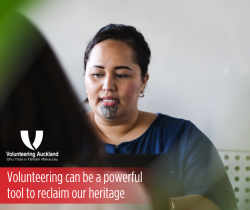Volunteering as a powerful tool to reclaim our heritage

The history of Aotearoa New Zealand is deeply marked by the impacts of colonisation, which has profoundly affected Māori communities. Over the years, Māori have engaged in a tireless struggle to address the injustices brought by colonisation and to promote the rights and sovereignty of their people.
Volunteering and activism have been central to these efforts, allowing Māori to mobilise, advocate, and enact change that aligns with their cultural values and aspirations. This article explores how Māori have used volunteering and activism as powerful tools to reclaim their rights, protect their land and culture, and promote self-determination.
Historical Context: The Impact of Colonisation on Māori Communities
Colonisation in New Zealand began in earnest with the arrival of European settlers in the early 19th century, leading to significant social, economic, and cultural disruption for Māori. The signing of the Treaty of Waitangi in 1840, intended to be a partnership between Māori and the British Crown, instead led to widespread land confiscation, marginalisation, and the erosion of Māori sovereignty. The resulting loss of land and resources, along with the suppression of Māori language and culture, had devastating effects on Māori communities, contributing to systemic poverty, health disparities, and social dislocation.
In response to these challenges, Māori have engaged in ongoing efforts to address the legacy of colonisation. Volunteering and activism have played a crucial role in these efforts, enabling Māori to organise collectively, advocate for their rights, and work towards the restoration of their cultural and political sovereignty.
The Role of Māori Women in Activism and Volunteering
Māori women, or wāhine Māori, have been at the forefront of efforts to address the impacts of colonisation and promote the rights of Māori communities. The Māori Women’s Welfare League (MWWL), established in 1951, became a critical platform for Māori women to advocate for social and health improvements within their communities. The League’s volunteer efforts were pivotal in addressing issues such as housing, education, and healthcare, all of which were areas heavily impacted by colonisation.
Throughout the 20th century and into the present, Māori women have continued to lead grassroots movements aimed at restoring Māori sovereignty and protecting their rights. Their activism has often focused on issues such as the preservation of te reo Māori (the Māori language), the protection of Māori land, and the promotion of Māori health and well-being. By volunteering their time and resources, wāhine Māori have been instrumental in mobilising their communities and ensuring that the voices of Māori are heard in national and local decision-making processes.
Land Rights and Environmental Activism
One of the most significant areas of Māori activism has been the struggle for land rights. The dispossession of land through colonisation has been a central issue for Māori, leading to numerous protests, legal battles, and campaigns aimed at reclaiming land and protecting natural resources. Volunteering has been an essential component of these efforts, with Māori organising at the grassroots level to defend their ancestral lands and waters.
The 1975 Māori land march, led by Dame Whina Cooper, was a landmark event in the history of Māori activism. This hīkoi (march) from Te Hāpua in the far north to Wellington drew national attention to the issue of Māori land loss. The march was organised largely through volunteer efforts, with many Māori dedicating their time and resources to support the cause. This movement laid the foundation for future land rights activism, including the establishment of the Waitangi Tribunal, which was set up to address breaches of the Treaty of Waitangi.
In more recent years, Māori have continued to lead environmental activism, particularly in the areas of land and water protection. The concept of kaitiakitanga, or guardianship of the environment, is central to Māori culture and has been a driving force behind Māori-led environmental initiatives. Māori volunteers have been active in conservation efforts, river clean-ups, and campaigns to protect sacred sites from commercial development. These efforts not only protect the environment but also reinforce the connection between Māori identity and the land.
Revitalising Māori Language and Culture
The revitalisation of te reo Māori and Māori culture has been another key focus of Māori activism and volunteering. The effects of colonisation included the suppression of the Māori language and cultural practices, leading to a decline in their use. However, from the 1970s onwards, Māori communities began to organise efforts to reverse this trend.
One of the most successful initiatives has been the kōhanga reo (Māori language preschools) movement, which began in the early 1980s. These preschools were established by Māori volunteers and activists who were committed to ensuring that future generations would grow up fluent in te reo Māori. The kōhanga reo movement has since expanded into kura kaupapa Māori (Māori immersion schools) and whare wānanga (Māori tertiary institutions), creating a comprehensive system for Māori language education. These educational institutions have been pivotal in revitalising te reo Māori and ensuring its survival for future generations.
The success of these initiatives is a testament to the power of community-driven volunteerism. By mobilising resources and people at the grassroots level, Māori have been able to create educational opportunities that align with their cultural values and priorities. These efforts have not only revitalised the Māori language but have also strengthened Māori identity and cultural pride.
Political Activism and Self-Determination
Political activism has been a crucial aspect of Māori efforts to address the impacts of colonisation and promote their rights. Māori have been active in advocating for policy changes, legal reforms, and greater representation in government. The rise of Māori political parties, such as the Māori Party, has provided a platform for Māori to influence national policies and advocate for the recognition of Māori sovereignty.
Volunteering has played a key role in these political efforts, with Māori organising campaigns, rallies, and educational initiatives to raise awareness of Māori issues. The establishment of the Waitangi Tribunal, the recognition of te reo Māori as an official language, and the creation of Māori seats in Parliament are all outcomes of sustained Māori activism and volunteer efforts.
The drive for self-determination, or tino rangatiratanga, remains a central focus of Māori activism. This concept encompasses the desire for Māori to have control over their own affairs, including land, resources, and cultural practices. Through volunteering and activism, Māori continue to push for greater recognition of their rights and the implementation of policies that respect Māori sovereignty.
Conclusion
The role of Māori in addressing the impacts of colonisation and promoting the rights and sovereignty of Māori communities through volunteering and activism has been profound and transformative. From grassroots initiatives to national movements, Māori have demonstrated resilience, leadership, and a deep commitment to their people and culture. Their efforts have not only addressed the injustices of the past but have also laid the groundwork for a more just and equitable future for all New Zealanders. Through continued activism and volunteerism, Māori will undoubtedly continue to shape the social and political landscape of Aotearoa New Zealand for generations to come.

